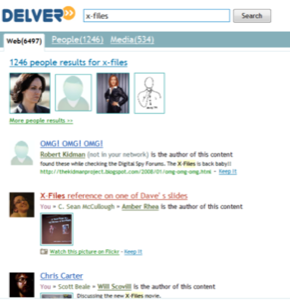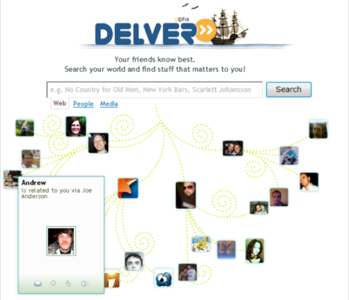Information overload is a topic that keeps coming up, especially among users of social media services. As you add more friends and more services, the amount of content produced can become overwhelming to keep up with which leads to quality items being lost amongst the “noise.” Noise-reducing apps like AideRSS or Moopz(both of which we love) highlight the best content, but their one drawback is that they determine relevance based on what the community thinks – and that may or may not be what you find interesting or important. With the new social search service from Delver, however, you can leverage your social graph to find just the information you’re looking for from the people you admire and/or trust and that makes finding content a much more personal experience.

About Delver
We told you about the new social search engine Delver earlier this year (see: “Delver Reinvents Search“), but at that time, the site was still under development. Today, Delver has finally launched their service.
When you do a search on Delver, the service taps into your social graph to return its search results. It organizes and ranks publicly displayed content that comes from various online services like social networks, web sites, blogs, bookmarking services, and photo and video sharing sites that your friends belong to. A ‘breadcrumb’ is shown next to each result, showing how that result is related to the user, so you can see how it’s relevant to you. What Summize is to Twitter, Delver is for your entire social graph.
At the moment, Delver currently covers Myspace, Blogger, Flickr, LinkedIn, Youtube, Hi5, FriendFeed, Digg and Delicious. Other sources, like Facebook as well as other blogging platforms will be added to the service over the next few months. Facebook is harder to tap into because of their privacy controls, so to add Facebook content to Delver they’re building a Facebook app. The app will permit you to explicitly share select items from Facebook – like photo albums, for example – with Delver’s service.
Some Search Results on Delver

Search Buddies
A feature makes Delver even more useful, though, is the “search buddies” feature. This option lets you add certain friends as search buddies which will prioritize results from their networks higher than others. This way, you can give information sources you trust and value more weight than others. In addition, those you add don’t have to be friends you’re connected with on social networks – you can add anyone as a search buddy and they don’t need to confirm the addition – it’s not a “friending” feature, exactly, just a way to see more personalized results to your queries.
This feature is also useful for those people who aren’t as active on social networks themselves, but have friends who are – they don’t need to rely on their particular social graph per se, but can tap into sources (people) whose content is relevant to them.
Add Search Buddies To Make Search Results More Relevant and Personal

Save Your Stuff
Delver lets you save items you find interesting or informative to a sidebar of “Kept Items.” The system automatically categorizes them as web items, images, music, videos, or people. In a month or so, Delver will allow for sharing these items more publicly through the addition of a Kept Items widget which could highlight findings on your own web site or blog.
Saved Items

Partner Program
Along with the launch of the search service, Delver is also launching a partner program that will allow sites that host user generated content to integrate Delver’s technology into their web site.
Social Graphs – Social Media’s Next Frontier
While the big networks like Facebook, Google, and MySpace all fight for control of your social graph, services like Delver provide an easy workaround to tapping into the power of your social network. In addition, you can also use Delver to discover interesting “friend-of-a friends” that you may want to follow, as Delver digs deeper than just who you are connected to yourself.
Your Social Graph on Delver

Delver is still at a very early age of development, but even so, the service demonstrates a lot of potential to become the next step in the social web’s evolution.

















